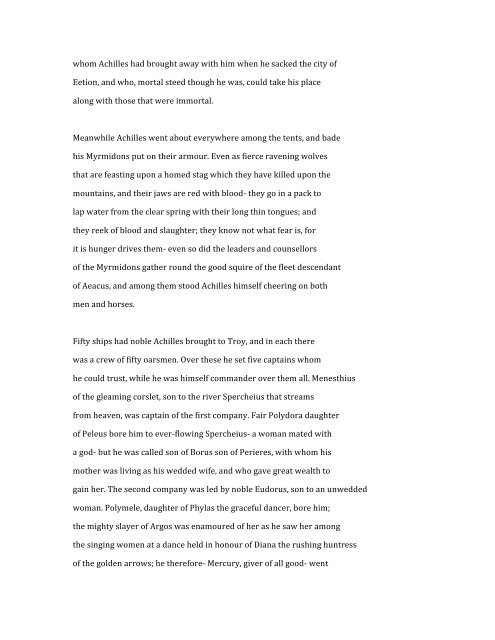- Page 1 and 2:
Provided by The Internet Classics A
- Page 3 and 4:
day long the pyres of the dead were
- Page 5 and 6:
feature, in understanding and accom
- Page 7 and 8:
may fear to set himself up as equal
- Page 9 and 10:
With all sincerity and goodwill, th
- Page 11 and 12:
the tent of Achilles, son of Peleus
- Page 13 and 14:
that which he has since done. The A
- Page 15 and 16:
Thus did he pray, and Apollo heard
- Page 17 and 18:
her taunting speeches; even now she
- Page 19 and 20:
As he spoke, he took a double cup o
- Page 21 and 22:
Jove. Remember this, and when you w
- Page 23 and 24:
Then King Agamemnon rose, holding h
- Page 25 and 26:
alone. He had not as yet laid a han
- Page 27 and 28:
should bring them into such misery.
- Page 29 and 30:
a prodigy; for Jove sent a fearful
- Page 31 and 32:
will not stave off destruction for
- Page 33 and 34:
holding her priceless aegis that kn
- Page 35 and 36:
ore them in the house of Actor son
- Page 37 and 38:
king, and had most men under him. A
- Page 39 and 40:
The famous spearsman Idomeneus led
- Page 41 and 42:
a leader, though they mourned him w
- Page 43 and 44:
terrible as Mars in battle. Of the
- Page 45 and 46:
who excelled in all kinds of divina
- Page 47 and 48:
When the companies were thus arraye
- Page 49 and 50:
for Helen and all her wealth. Let h
- Page 51 and 52:
Thus spoke the goddess, and Helen's
- Page 53 and 54:
conversation. When they stood up in
- Page 55 and 56:
princes, and the son of Atreus lift
- Page 57 and 58:
the son of Atreus, but the spear di
- Page 59 and 60:
went in silence, following the godd
- Page 61 and 62:
Minerva and Juno muttered their dis
- Page 63 and 64:
he would be the first to requite yo
- Page 65 and 66:
he. will yet fulfil it hereafter, a
- Page 67 and 68:
orders to so many, for he went amon
- Page 69 and 70:
so as to avoid confusion. "Let no m
- Page 71 and 72:
say that there was no man like him.
- Page 73 and 74:
till she uprears her head to heaven
- Page 75 and 76:
to the Trojans, for he was displeas
- Page 77 and 78:
the nipple, and he fell from his ch
- Page 79 and 80:
as he was flying before him, smote
- Page 81 and 82:
go furiously about among the Trojan
- Page 83 and 84:
made them still more furious. I did
- Page 85 and 86:
out and said, "You are hit clean th
- Page 87 and 88:
lest some Danaan should drive a spe
- Page 89 and 90:
lord, Diomed the bravest of the Ach
- Page 91 and 92:
from afar, even from Lycia and the
- Page 93 and 94:
and was descended from the river Al
- Page 95 and 96:
of great wealth who lived in Paesus
- Page 97 and 98:
since I may not return home to glad
- Page 99 and 100:
sitting all alone on the topmost ri
- Page 101 and 102:
"Diomed, son of Tydeus," replied Mi
- Page 103 and 104:
He then bade Paeeon heal him, where
- Page 105 and 106:
alive and at the ships of the Achae
- Page 107 and 108:
to the gods and vow hecatombs in th
- Page 109 and 110:
forth flames of fire; but Belleroph
- Page 111 and 112:
there were twelve upper rooms also
- Page 113 and 114:
point gleamed in front of him, and
- Page 115 and 116:
Hector hurried from the house when
- Page 117 and 118:
He stretched his arms towards his c
- Page 119 and 120:
BOOK VII With these words Hector pa
- Page 121 and 122:
"Hear me, Trojans and Achaeans, tha
- Page 123 and 124:
with bow nor spear, but broke the b
- Page 125 and 126:
even so did huge Ajax, bulwark of t
- Page 127 and 128:
Ajax son of Telamon answered, "Idae
- Page 129 and 130:
as I am minded. Let us give up Argi
- Page 131 and 132:
their ships, some to gather the cor
- Page 133 and 134:
BOOK VIII Now when Morning, clad in
- Page 135 and 136:
Now so long as the day waxed and it
- Page 137 and 138:
All had then been lost and no help
- Page 139 and 140:
Thus did he vaunt, but Queen Juno m
- Page 141 and 142:
After him came Agamemnon and Menela
- Page 143 and 144:
two trusty squires, Mecisteus son o
- Page 145 and 146:
fighting there will be mischief. Th
- Page 147 and 148:
And Jove answered, "To-‐morrow
- Page 149 and 150:
sweating steeds from under the yoke
- Page 151 and 152:
go-‐ the way is open to you; th
- Page 153 and 154:
a truer mind than that which has be
- Page 155 and 156:
Thus did he speak, and his saying p
- Page 157 and 158:
Jove is with him he fears neither g
- Page 159 and 160:
I hate even as the gates of hell wh
- Page 161 and 162:
have; he may promise me the wealth
- Page 163 and 164:
e branded as the murderer of my fat
- Page 165 and 166:
was angry and did them hurt because
- Page 167 and 168:
And Achilles answered, "Phoenix, ol
- Page 169 and 170:
Ulysses answered, "Most noble son o
- Page 171 and 172:
He covered his broad back with the
- Page 173 and 174:
us go the round of the watch, and s
- Page 175 and 176:
heart is of iron; you rest not one
- Page 177 and 178:
the Trojans, for he was ever full o
- Page 179 and 180:
had done praying to the daughter of
- Page 181 and 182:
a doe or hare that runs screaming i
- Page 183 and 184:
"I will tell you truly all," replie
- Page 185 and 186:
for they were not yet used to them.
- Page 187 and 188:
about which you ask me, are freshly
- Page 189 and 190:
On his head Agamemnon set a helmet,
- Page 191 and 192:
withes as they were shepherding, bu
- Page 193 and 194:
with hands all bedrabbled in gore;
- Page 195 and 196:
point of the spear struck against t
- Page 197 and 198:
What, then is the full tale of thos
- Page 199 and 200:
with his brawny hand leaning on the
- Page 201 and 202:
gnashing of his jaws, but for all h
- Page 203 and 204:
Ajax then came up with his shield b
- Page 205 and 206:
As peasants with their hounds chase
- Page 207 and 208:
When Nestor and Machaon had reached
- Page 209 and 210:
field. At daybreak the heralds went
- Page 211 and 212:
Pylians a great victory, for we cha
- Page 213 and 214:
now before his spear?" Wounded Eury
- Page 215 and 216:
and then when he had swept the wall
- Page 217 and 218:
was captain over the allies, and to
- Page 219 and 220:
stand firm either to slay or be sla
- Page 221 and 222:
obbed you of your reason. You would
- Page 223 and 224:
him, and brandishing his two spears
- Page 225 and 226:
I will come back here at once as so
- Page 227 and 228:
the blood alike of Trojans and of A
- Page 229 and 230:
Presently he came down from his pos
- Page 231 and 232:
within me, while my hands and my fe
- Page 233 and 234:
of the dull thing have been loosene
- Page 235 and 236:
and sent it whirling over the crowd
- Page 237 and 238:
valorous, and wherever there has be
- Page 239 and 240:
and main did they hack at each othe
- Page 241 and 242:
his cuirass of bronze did not prote
- Page 243 and 244:
you were a child in his house, and
- Page 245 and 246:
Meriones sprang upon him like a vul
- Page 247 and 248: who in his turn wounded the hand wi
- Page 249 and 250: Paris was deeply grieved by the dea
- Page 251 and 252: The Trojans would now have been dri
- Page 253 and 254: ave Polydamas, Phalces, Orthaeus, g
- Page 255 and 256: his father's shield; he grasped his
- Page 257 and 258: draw down the rest of the fleet. Th
- Page 259 and 260: upon the plain, and you shall see t
- Page 261 and 262: they will be grateful to me and lov
- Page 263 and 264: Sleep was pleased when he heard thi
- Page 265 and 266: and tell the others? It would be su
- Page 267 and 268: the blast of Boreas, nor do the fla
- Page 269 and 270: The Argives were maddened by this b
- Page 271 and 272: -‐-‐-‐-‐-‐-
- Page 273 and 274: and among them my own noble son Sar
- Page 275 and 276: to Olympus, after having caused inf
- Page 277 and 278: Iris fleet as the wind then answere
- Page 279 and 280: over the plain to the place where h
- Page 281 and 282: The fight then became more scattere
- Page 283 and 284: Now Patroclus, so long as the Achae
- Page 285 and 286: King Polydamas saw what had happene
- Page 287 and 288: Laodamas captain of foot soldiers a
- Page 289 and 290: has hit as it was breaking away fro
- Page 291 and 292: an up to him; he then thrust a spea
- Page 293 and 294: close combat with their mighty swor
- Page 295 and 296: Then, O knight Patroclus, with a de
- Page 297: mine. And do not for lust of battle
- Page 301 and 302: on shield, helm on helm, and man on
- Page 303 and 304: With these words he put heart and s
- Page 305 and 306: Peneleos and Lycon now met in close
- Page 307 and 308: mountains to the dark sea, and it f
- Page 309 and 310: in due honour to the dead." The sir
- Page 311 and 312: not his son, do you, therefore, O k
- Page 313 and 314: the front rank of his men gave grou
- Page 315 and 316: fled, bidding the other Trojans fly
- Page 317 and 318: likeness Jove's son Apollo now spok
- Page 319 and 320: men; but as he was coming on like a
- Page 321 and 322: among mortal men Euphorbus; you are
- Page 323 and 324: not go through, for the shield turn
- Page 325 and 326: on fighting, for Phoebus Apollo had
- Page 327 and 328: fight might and main, while I put o
- Page 329 and 330: him power and glory, the fight is s
- Page 331 and 332: then gave ground, while the Argives
- Page 333 and 334: Trojans; they were keeping themselv
- Page 335 and 336: ageless and immortal? Was it that y
- Page 337 and 338: on the lap of heaven, I will theref
- Page 339 and 340: his own people. Apollo then went up
- Page 341 and 342: among the Achaeans to send, for the
- Page 343 and 344: and our own escape from death amid
- Page 345 and 346: inging fire against them, and not j
- Page 347 and 348: my dear comrade Patroclus has falle
- Page 349 and 350:
Thus, then, did her feet bear the g
- Page 351 and 352:
the going down of the sun the line
- Page 353 and 354:
protect the city. At dawn we can ar
- Page 355 and 356:
set a tripod full of bath water on
- Page 357 and 358:
washed his face and hands, his shag
- Page 359 and 360:
He wrought the earth, the heavens,
- Page 361 and 362:
and they would go back to their fur
- Page 363 and 364:
of the river Oceanus. Then when he
- Page 365 and 366:
limping, for their wounds still pai
- Page 367 and 368:
child and in her seventh month, Jun
- Page 369 and 370:
have me do; I do so of my own free
- Page 371 and 372:
and take vengeance on him who shall
- Page 373 and 374:
of Helen, nor yet though I should h
- Page 375 and 376:
with the harnessing of his horses;
- Page 377 and 378:
I have called you hither. I take th
- Page 379 and 380:
with which you vaunted over your wi
- Page 381 and 382:
other gods seated themselves on the
- Page 383 and 384:
he had three thousand mares that fe
- Page 385 and 386:
will now go down to the house of Ha
- Page 387 and 388:
anks, and woe to the Trojan who sha
- Page 389 and 390:
When Hector saw his brother Polydor
- Page 391 and 392:
him in the face. Achilles cut his h
- Page 393 and 394:
lood. There he found Lycaon, son of
- Page 395 and 396:
ansom. Until Patroclus fell I prefe
- Page 397 and 398:
with the other spear he grazed the
- Page 399 and 400:
Meanwhile Achilles sprang from the
- Page 401 and 402:
strove onward over the plain, encou
- Page 403 and 404:
laze under it-‐ even so were th
- Page 405 and 406:
length. Then Minerva vaunted over h
- Page 407 and 408:
to escape. Even so did she fly weep
- Page 409 and 410:
care. "Alas," said he to himself in
- Page 411 and 412:
from off them and drank to quench t
- Page 413 and 414:
some one has beaten the life out of
- Page 415 and 416:
like flashing fire or the rays of t
- Page 417 and 418:
gates and under the walls, that his
- Page 419 and 420:
Achilles glared at him and answered
- Page 421 and 422:
divide the neck from the shoulders,
- Page 423 and 424:
their city now that Hector has fall
- Page 425 and 426:
he came out of battle; poor woman,
- Page 427:
The wriggling writhing worms will n





